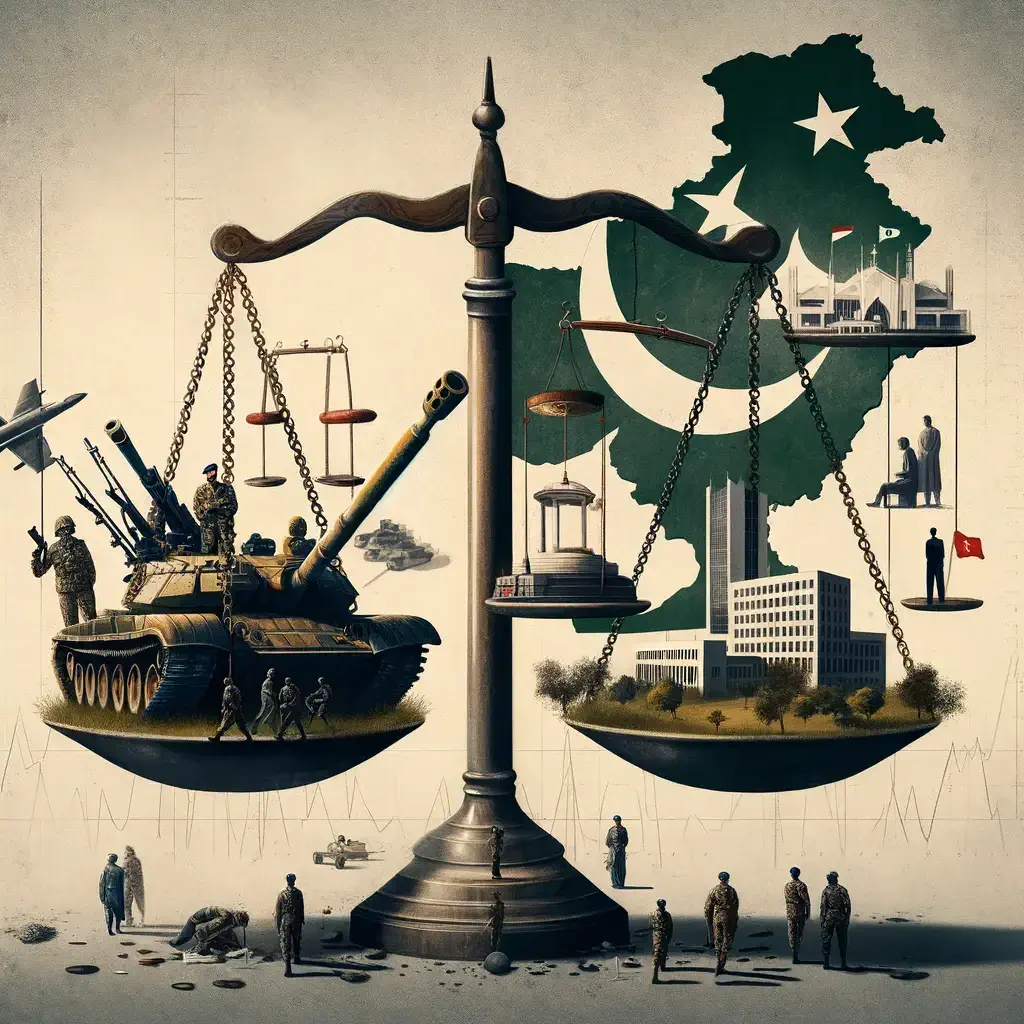Balancing Act: Examining the Expansive Role of Pakistan's Army in National Affairs
In this blog, I will discuss the role of Pakistan's army in the country from a current perspective. In my previous blog, 'Pakistan at a Tipping Point,' I took a historical approach, examining the army's evolution since the country's independence. I explored how Pakistan inherited a disproportionately large military apparatus relative to its population and how the military-industrial complex functions in Pakistan. That blog delves into why the army wields significant power and how they justify it by leveraging the narrative of external threats and using religion for control.
In this blog, I'll focus on the current state of the army and its role. Let’s start by asking, 'What is the army's role in a country?' The average person might immediately think of national defense - protecting the country from external threats and military aggression. This includes safeguarding territorial integrity and defending national interests. Historically, this has been the fundamental purpose of an army.
Expanding on this role, armies in some countries also contribute to internal security, handling internal conflicts, insurgencies, or terrorism. In emergency situations like natural disasters - earthquakes, floods, or hurricanes - armies are often deployed for relief and assistance.
While these are the primary purposes, the army's role can be more extensive. Armies are sometimes involved in peacekeeping missions, supporting civil authorities, providing a deterrent presence against other nations, and contributing to global security. However, the primary focus of this blog is on Pakistan's army and its unique role within the country.
Understanding the purpose of an army leads us to examine the specific role of Pakistan's army. Generally, an army is just another institution, with the primary aim of strengthening itself and supporting other national institutions. Ideally, it should not interfere with other institutions. However, in Pakistan's context, the reality is somewhat different. The army not only interferes but does so to a degree that it undermines other institutions. This interference extends to the parliament, judicial system, and civil bureaucratic establishments.
For instance, the army's involvement in parliamentary affairs and electoral processes significantly impacts democratic governance. The manipulation of voting and political power dynamics by the army erodes the very foundations of a democratic system. Similarly, the army's influence over the judiciary and civil bureaucracy is evident. There are instances where retired, and sometimes active, army personnel lead civil institutions. This overlap of military and civil roles can lead to a conflict of interests, where decisions are driven by military objectives rather than civil priorities.
Such practices have profound implications for the country. When institutions are weakened or manipulated, national progress is hindered. A nation cannot thrive when its institutions are compromised, lacking independence and subject to constant interference.
“In the councils of government, we must guard against the acquisition of unwarranted influence, whether sought or unsought, by the military-industrial complex.”
Dwight D. Eisenhower
Moreover, the army in Pakistan extends its influence beyond traditional roles. It has ventured into business sectors, competing with the private sector in areas like construction, utilities, banking, manufacturing, retail and more. This involvement raises questions about the army's role in the economy and its impact on private enterprise.
Now, let's consider the financial aspect. The allocation of national resources to the army in Pakistan is significant. The country ranks high globally in terms of military spending as a percentage of GDP. This is particularly notable for a developing nation. The chart below illustrates this, showing Pakistan's military expenditure in relation to other countries.
|
Rank |
Country |
Military Spending (% of GDP) |
Military Spending (USD) |
Military Size (Active Personnel) |
|
1 |
Saudi Arabia |
Approx. 8.8% |
$67.6 billion |
About 227,000 |
|
2 |
Israel |
Approx. 5.6% |
$20.5 billion |
About 170,000 |
|
3 |
Russia |
Approx. 4.3% |
$61.7 billion |
About 1,000,000 |
|
4 |
Pakistan |
Approx. 4.0% |
$10.4 billion |
About 654,000 |
|
5 |
United States |
Approx. 3.7% |
$732 billion |
About 1,300,000 |
|
6 |
India |
Approx. 2.9% |
$71.1 billion |
About 1,440,000 |
|
7 |
South Korea |
Approx. 2.7% |
$43.9 billion |
About 600,000 |
|
8 |
China |
Approx. 1.9% |
$252 billion |
About 2,035,000 |
|
9 |
United Kingdom |
Approx. 1.8% |
$59.2 billion |
About 192,660 |
|
10 |
France |
Approx. 1.7% |
$50.1 billion |
About 203,000 |
For context, nations like Japan and Canada spend a much smaller percentage of their GDP on their military. This raises the question of whether such high military spending is justified, especially in the absence of significant external threats.
This excessive military expenditure comes at a cost to the Pakistani populace, as resources that could potentially be used for development and social welfare are diverted to the military. The contrast becomes starker when comparing Pakistan's spending with that of countries that either have no army, like Costa Rica, or those that maintain a minimal military presence relative to their GDP, such as Japan and Canada.
|
Rank |
Country |
Military Spending (% of GDP) |
Military Spending (USD) |
Military Size (Active Personnel) |
|
1 |
Costa Rica |
0% |
No official military |
No official military |
|
2 |
Iceland |
Approx. 0.1% |
$12 million |
No standing army |
|
3 |
Ireland |
Approx. 0.3% |
$1.1 billion |
About 9,500 |
|
4 |
Luxembourg |
Approx. 0.5% |
$369 million |
About 900 |
|
5 |
Panama |
Approx. 0.6% |
$430 million |
About 16,000 |
|
6 |
Austria |
Approx. 0.7% |
$3.1 billion |
About 26,000 |
|
7 |
Japan |
Approx. 1.0% |
$47.6 billion |
About 247,000 |
|
8 |
Canada |
Approx. 1.3% |
$22.2 billion |
About 67,000 |
|
9 |
Denmark |
Approx. 1.3% |
$4.7 billion |
About 17,000 |
|
10 |
Netherlands |
Approx. 1.4% |
$11 billion |
About 35,000 |
I believe a balanced approach is necessary. While each country's geopolitical context and security needs are unique, a military budget exceeding 2% of GDP seems excessive, especially for a developing nation like Pakistan. Such high expenditure not only strains the economy but also limits investment in critical areas like education, health, and infrastructure.
Furthermore, the army's involvement in civilian affairs extends beyond budgetary issues. There's a growing trend of military personnel assuming leadership roles in civilian institutions. This blurring of lines between military and civil domains can lead to a skewed prioritization of national interests, often favoring military objectives over civilian needs.
"A professional and disciplined military under the control of civilian leadership is fundamental to democracy."
- Roelof "Pik" Botha
Pakistan's future hinges on addressing these challenges. The army needs to reassess its role and focus on core responsibilities - national defense and support in emergencies. For sustainable progress, the military must function under the guidance of a democratically elected government and respect the autonomy of civilian institutions.
Reform is imperative for the longevity of the nation. Minor adjustments may offer temporary relief, but comprehensive reforms are essential for enduring stability. An educated and aware populace is key to this transformation. With increased awareness and unity, the people of Pakistan can advocate for their rights and push for necessary changes.
In conclusion, my current perspective on the army's role in Pakistan highlights the need for a significant shift in its approach and functions. Social media and other platforms can play a crucial role in educating the public and fostering a spirit of resilience and advocacy. While the path to reform is fraught with challenges and sacrifices, it's a necessary journey for the freedom and prosperity of the nation. Only through systemic change can Pakistan avoid the pitfalls of internal strife and progress towards a stable and prosperous future.

